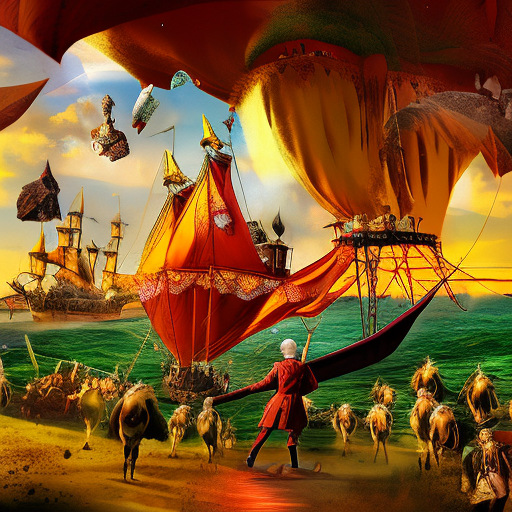One-line Summary:
Gulliver’s Travels is a satirical novel that follows Lemuel Gulliver’s extraordinary adventures in four different imaginary lands, highlighting the flaws of human society and the importance of perspective.
Gulliver’s First Voyage: Lilliput
In the first voyage, Gulliver finds himself stranded on the island of Lilliput, inhabited by tiny people who are only six inches tall. Initially captured and held captive, Gulliver eventually gains favor with the Lilliputians by helping them in their war against their neighboring island, Blefuscu. Through this journey, author Jonathan Swift satirizes the pettiness of politics, the absurdity of war, and the power struggles that plague society. The Lilliputians’ obsession with trivial matters, such as the proper way to crack an egg, highlights the absurdity of human conflicts and the misplaced priorities of those in power.
Gulliver’s Second Voyage: Brobdingnag
In his second voyage, Gulliver finds himself in Brobdingnag, a land inhabited by giants. Here, he is the one who becomes the small and vulnerable creature, facing the scrutiny of the giant inhabitants. Swift uses this reversal of power to critique the flaws of human nature and society. Gulliver’s observations of the giants’ physical imperfections, such as their unpleasant smells and blemishes, highlight the universal presence of flaws and the futility of striving for perfection. Through Gulliver’s interactions with the Brobdingnagians, Swift also criticizes the arrogance and ignorance of European society, contrasting it with the wisdom and rationality of the giants.
Gulliver’s Third Voyage: Laputa, Balnibarbi, Luggnagg, and Glubbdubdrib
In his third voyage, Gulliver visits several strange lands, including Laputa, a floating island inhabited by impractical intellectuals, and Luggnagg, where he encounters the Struldbrugs, who are cursed with immortality but not eternal youth. Swift uses these lands to satirize the follies of science, bureaucracy, and the pursuit of immortality. The inhabitants of Laputa are so absorbed in their own thoughts and theories that they are completely disconnected from the real world, while the Struldbrugs, despite their immortality, suffer from the burden of old age and the realization that they will never find true happiness.
Gulliver’s Fourth Voyage: Houyhnhnms and Yahoos
In his final voyage, Gulliver arrives in the land of the Houyhnhnms, a race of intelligent and rational horses, and the Yahoos, a savage and bestial humanoid species. The Houyhnhnms represent reason and virtue, while the Yahoos symbolize the base and animalistic nature of humanity. Gulliver, who has spent years among the Yahoos, is initially repulsed by the Houyhnhnms’ rationality and lack of emotion. However, as he witnesses the corruption and irrationality of human society, he begins to see the value in the Houyhnhnms’ way of life. Swift uses this voyage to criticize the flaws of humanity, highlighting the destructive nature of greed, pride, and irrationality.
Key Takeaways:
- Swift uses satire to critique various aspects of human society, including politics, war, science, and the pursuit of perfection.
- The novel highlights the absurdity of human conflicts and the misplaced priorities of those in power.
- Swift emphasizes the flaws and imperfections that are inherent in human nature and society.
- The importance of perspective and the dangers of arrogance and ignorance are recurring themes throughout the book.
- The novel serves as a critique of European society, contrasting it with the wisdom and rationality of other fictional civilizations.
“I cannot but conclude the bulk of your natives to be the most pernicious race of little odious vermin that nature ever suffered to crawl upon the surface of the earth.”
– Jonathan Swift, Gulliver’s Travels
In Gulliver’s Travels, Jonathan Swift takes readers on a satirical journey through various imaginary lands, using the adventures of Lemuel Gulliver to expose the flaws of human society. From the pettiness of politics and the absurdity of war to the follies of science and the pursuit of immortality, Swift’s novel offers a scathing critique of the vices and follies that plague humanity. Through Gulliver’s encounters with different civilizations, Swift highlights the importance of perspective and the dangers of arrogance and ignorance. Ultimately, Gulliver’s Travels serves as a reminder that flaws and imperfections are inherent in human nature and that the pursuit of perfection is futile.












